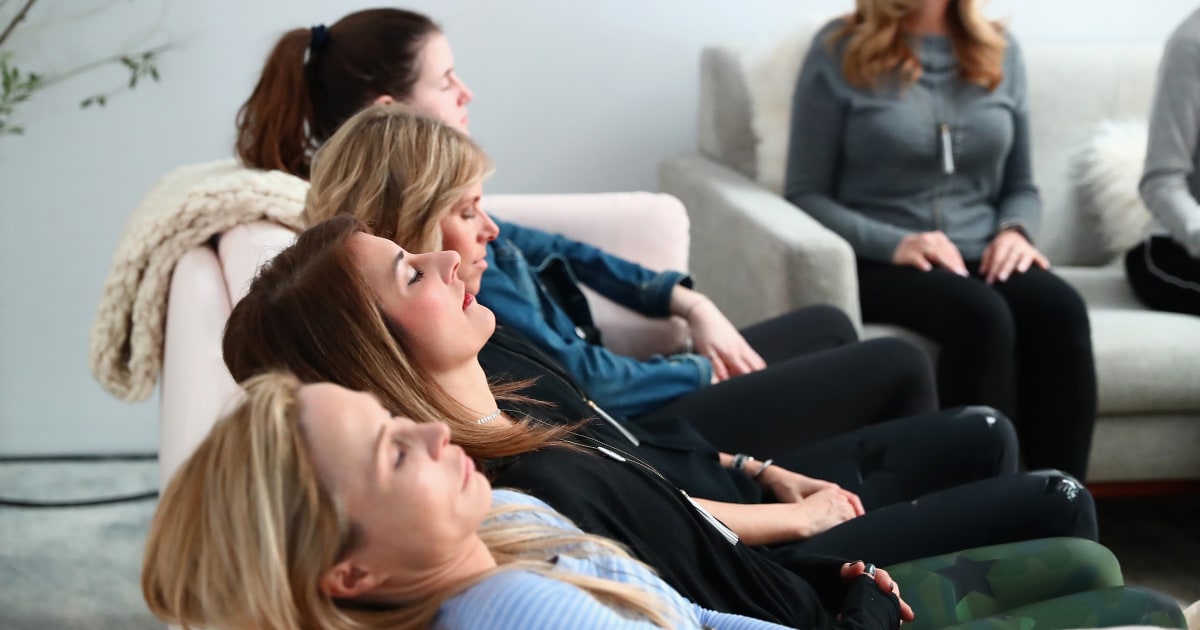The first study ever to directly compare medication to meditation for anxiety finds the two methods work equally well at reducing symptoms.
The finding, published Wednesday in the journal JAMA Psychiatry, suggests that people struggling with anxiety could be helped either by a daily pill (which could come with side effects) or a daily practice of mindfulness (which requires a substantial time commitment).
“For both treatments, we had people who said, ‘This really worked,’” said study author Dr. Elizabeth Hoge, director of the Anxiety Disorders Research Program and associate professor of psychiatry at Georgetown University Medical Center in Washington, D.C.
About 6.8 million adults in the U.S. have generalized anxiety disorder, but less than half receive treatment, according to the Anxiety & Depression Association of America.
The two-month study included 276 patients diagnosed with generalized anxiety disorder. Half were given a common antidepressant — escitalopram (brand name: Lexapro) — and the other half participated in a mindfulness-based stress reduction program.
Both groups reported moderate improvements: a 20% reduction in symptoms at the end of the study, regardless of their treatment.
That kind of benefit is consistent with other studies of medications to treat anxiety, said Craig Sawchuk, a psychologist at the Mayo Clinic in Rochester, Minnesota, who was not involved with the new research.
The study “shows there are alternative options that don’t involve medicine to help treat anxiety, that are just as effective,” said Lindsey McKernan, an associate professor of psychiatry and behavioral sciences at Vanderbilt University Medical Center in Nashville, Tennessee, who was also not involved with the study.
Side effects were more common among those who received the antidepressant; nearly 80% of the participants experienced at least one side effect, such as trouble sleeping, nausea, headaches, decreased libido and increased anxiety. Most were considered mild.
Just one side effect, increased anxiety, was reported in the mindfulness group, by about 15% of the participants.
The mindfulness program, however, was time-consuming: Participants were required to attend twice weekly 2 1/2-hour group classes for eight weeks, plus one full day at a meditation retreat. In addition, they were told to practice meditating for 45 minutes each day for the entire study period.
Hoge noted that at a six-month follow-up, 58% of people in the Lexapro group were still taking the drug, while just 28% in the meditation group were still practicing mindfulness at least four days a week.
It’s unclear why so many meditation participants appeared to drop off, she said. It could be that they were no longer experiencing symptoms, or that the time constraints were simply too great.
“It might be easier to remember to take a medication one time per day,” than fitting in a 45-minute meditation, Sawchuk said.
The time commitment to mindfulness throughout the study, however, was important for people to learn the proper techniques, Hoge said. Mindfulness involves focusing on one single thing, usually breathing, or the sounds going on around you, and clearing the mind of other thoughts.
That’s difficult to do for more than a few seconds before the mind wanders and reverts to thinking about other things: to-do lists, what ifs, concerns about the future. Mindfulness teaches the brain not to get so overwhelmed by these intrusive thoughts.
The thinking behind mindfulness, Hoge said, is that it can make the thoughts that fuel anxiety less powerful. She gave an example of a person worried about failing an exam. “Before treatment, that thought makes them sweaty and nervous and they can’t think about anything else,” she said. “But the problem is just the thought itself, not reality.”
Learning to accept such thoughts and move on “creates freedom,” Hoge said. “The thought arises, and it doesn’t have to take control of the person.”
“It’s like helping you build a system where you can learn how to respond to stress instead of react to it,” McKernan said.
Follow NBC HEALTH on Twitter & Facebook.
Share your story or advertise with us: Whatsapp: +2347068606071 Email: info@newspotng.com










